Atmosphere
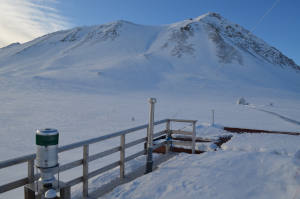 The atmosphere as an environmental matrix proves to be a medium of rapid global dispersion of climate-altering compounds and pollutants. Various compounds characterize the atmosphere; among these, climate-altering compounds, i.e., greenhouse gases that affect the Earth's energy and heat balance, and atmospheric aerosols, are of relevant interest. Due to its characteristics of stability and thermal inversion and the presence of the polar vortex, the polar atmosphere is an ideal observatory to be able to assess the energy exchanges and interactions of various phenomena with atmospheric circulation, including at different spatiotemporal scales, transport to high latitudes, aerosol composition, and biogeochemical cycles of the natural chemical species and pollutants present. Atmospheric aerosols play a key role in human-induced climate change because they influence the planet's radiative budget (absorption and scattering of solar radiation and surface albedo), cloud formation, and properties. In particular, atmospheric aerosols influence and amplify climate change. Atmospheric particulate matter consists of particles of natural origin (volcanic eruptions, fires, ocean emissions, resuspension of soil dust) and particles of anthropogenic origin (industrial emissions, combustion processes, micro- and nanoplastics). It is critical, thus, to identify chemical, biochemical, and biological tracers to study the origin and composition of polar aerosols and understand their climatic feedback. Although present in trace amounts, organic compounds, black carbon, sea salt, and microplastics (< 100 µm) may act as cloud condensation nuclei, thereby affecting albedo and precipitation, as well as radiation budget and climate. Black carbon, microplastics, and dust could also act as ice-nucleating particles.
The atmosphere as an environmental matrix proves to be a medium of rapid global dispersion of climate-altering compounds and pollutants. Various compounds characterize the atmosphere; among these, climate-altering compounds, i.e., greenhouse gases that affect the Earth's energy and heat balance, and atmospheric aerosols, are of relevant interest. Due to its characteristics of stability and thermal inversion and the presence of the polar vortex, the polar atmosphere is an ideal observatory to be able to assess the energy exchanges and interactions of various phenomena with atmospheric circulation, including at different spatiotemporal scales, transport to high latitudes, aerosol composition, and biogeochemical cycles of the natural chemical species and pollutants present. Atmospheric aerosols play a key role in human-induced climate change because they influence the planet's radiative budget (absorption and scattering of solar radiation and surface albedo), cloud formation, and properties. In particular, atmospheric aerosols influence and amplify climate change. Atmospheric particulate matter consists of particles of natural origin (volcanic eruptions, fires, ocean emissions, resuspension of soil dust) and particles of anthropogenic origin (industrial emissions, combustion processes, micro- and nanoplastics). It is critical, thus, to identify chemical, biochemical, and biological tracers to study the origin and composition of polar aerosols and understand their climatic feedback. Although present in trace amounts, organic compounds, black carbon, sea salt, and microplastics (< 100 µm) may act as cloud condensation nuclei, thereby affecting albedo and precipitation, as well as radiation budget and climate. Black carbon, microplastics, and dust could also act as ice-nucleating particles. 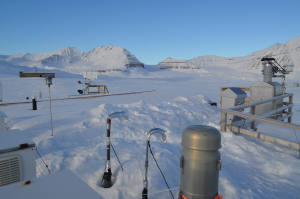 The presence of these particles in the atmosphere and sea ice impacts albedo and can alter sea ice permeability and solar radiation absorption with feedback on sea ice melt. In a rapidly changing polar area like the Arctic, microplastic pollution adds to the effects of climate change in terms of sources, transport processes, feedback, and ecological consequences. Other stressors present in atmospheric aerosols may include medium volatile organic compounds, water-soluble compounds, phenolic compounds, and trace elements. The presence of chemical stressors affects the physical dynamics of the atmosphere, mainly through interaction with both solar and terrestrial radiation, helping to amplify the increase in air temperature, which in turn impacts sea ice melting, humidity, cloudiness, and precipitation, significantly affecting the climate system. Monitoring the physical parameters and processes and the dynamics of the atmosphere through the use of various measurement methodologies (including remote sensing) is essential for the in-depth understanding of the synergies between the various components and for developing increasingly efficient weather-climate forecasting models. It is necessary to study in depth all the processes that characterize the atmospheric boundary layer to improve the quality of the results of weather and climate forecasting models.
The presence of these particles in the atmosphere and sea ice impacts albedo and can alter sea ice permeability and solar radiation absorption with feedback on sea ice melt. In a rapidly changing polar area like the Arctic, microplastic pollution adds to the effects of climate change in terms of sources, transport processes, feedback, and ecological consequences. Other stressors present in atmospheric aerosols may include medium volatile organic compounds, water-soluble compounds, phenolic compounds, and trace elements. The presence of chemical stressors affects the physical dynamics of the atmosphere, mainly through interaction with both solar and terrestrial radiation, helping to amplify the increase in air temperature, which in turn impacts sea ice melting, humidity, cloudiness, and precipitation, significantly affecting the climate system. Monitoring the physical parameters and processes and the dynamics of the atmosphere through the use of various measurement methodologies (including remote sensing) is essential for the in-depth understanding of the synergies between the various components and for developing increasingly efficient weather-climate forecasting models. It is necessary to study in depth all the processes that characterize the atmospheric boundary layer to improve the quality of the results of weather and climate forecasting models.
Main ERC Panels:
• LS8 - Ecology, Evolution and Environmental Biology
• PE4 - Physical and Analytical Chemical Sciences
• PE10 - Earth System Science
• SH2 - Institutions, Values, Environment and Space
• SH7 - Human Mobility, Environment, and Space
Biosphere
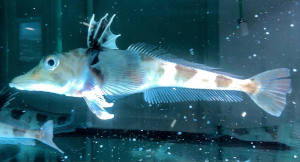 Global changes are the effects of the interactions between different phenomena and changes that are occurring on a planetary scale; from global warming to climate changes, from increasing carbon dioxide to rainfall and oceans acidification, from melting and retreating glaciers, thawing permafrost, rising sea levels and changes in marine and ocean circulation, and extreme weather events. In addition, residues from anthropogenic contamination and pollution activities accelerate destructive processes. These mutual interactions affect both Polar Regions by leading to dramatic changes in the behavior and physiology of species, ecosystems and biodiversity. The Polar Regions have enormous natural resources and provide, for example, some of the most productive fisheries on the planet. However, polar environments and ecosystems are fragile and vulnerable. Our research focuses on understanding the effects of change on ecosystems with a holistic view: from microbial communities to higher organisms with both a local and circumpolar view.
Global changes are the effects of the interactions between different phenomena and changes that are occurring on a planetary scale; from global warming to climate changes, from increasing carbon dioxide to rainfall and oceans acidification, from melting and retreating glaciers, thawing permafrost, rising sea levels and changes in marine and ocean circulation, and extreme weather events. In addition, residues from anthropogenic contamination and pollution activities accelerate destructive processes. These mutual interactions affect both Polar Regions by leading to dramatic changes in the behavior and physiology of species, ecosystems and biodiversity. The Polar Regions have enormous natural resources and provide, for example, some of the most productive fisheries on the planet. However, polar environments and ecosystems are fragile and vulnerable. Our research focuses on understanding the effects of change on ecosystems with a holistic view: from microbial communities to higher organisms with both a local and circumpolar view.
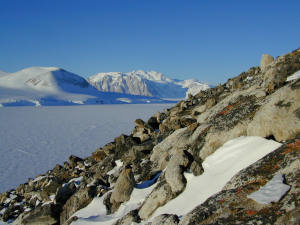 In this thematic area, with a strongly multidisciplinary approach, we consider different aspects of polar ecosystems (both Arctic and Antarctic) and the services they provide: from the impact of natural and anthropogenic pressures on both marine and terrestrial polar ecosystems, to the ability of species and ecosystems to respond to these changes.
In this thematic area, with a strongly multidisciplinary approach, we consider different aspects of polar ecosystems (both Arctic and Antarctic) and the services they provide: from the impact of natural and anthropogenic pressures on both marine and terrestrial polar ecosystems, to the ability of species and ecosystems to respond to these changes.
Understanding polar ecosystems through the study of biodiversity and resilience to environmental change is critical to developing ecosystem-centered conservation and management strategies. Specifically, the topics covered are:
• structure and functioning of polar ecosystems.
• Ecosystems responses to natural and anthropogenic drivers.
• Influence of climate change on pollutant levels in biota and trophic nets.
• Ecosystems modelling also in light of future changes.
• Role of protected areas in polar areas.
Main ERC Panels:
• LS8 - Ecology, Evolution and Environmental Biology
• PE4 - Physical and Analytical Chemical Sciences
• PE10 - Earth System Science
Cryosphere
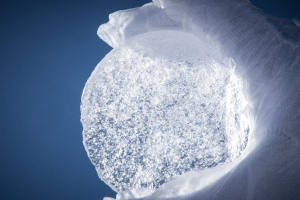 The melting of ice caps and glaciers in general, the consequent change in sea level, the acclaimed collapse of the glacial shelves highlight how this part of the cryosphere is a fragile portion of the Earth system. Glaciers are unique climatic archives. Ice cores, both from polar areas and from glaciers at medium latitudes make it possible to study climatic and palaeoclimatic events that have occurred over time in order to evaluate the impacts on the climatic evolution of our planet produced by forcers such as volcanic and fire emissions, as well as sea ice, oceanic productivity and anthropic pressure. The response of glaciers, and in particular those of the alpine type and not connected to large caps, depends on the evolution of the Equilibrium Line Altitude (ELA). In addition to local factors, the ELA mainly depends on climatic parameters and modulates the areal variations of the glacial and nival accumulation basins. As such, ELA represents a very powerful tool for the reconstruction of glacial masses both from a palaeoclimate point of view and for future projections. Further diagnostic elements are provided by the marine climatic archives, which allow the reconstructions of the climate and of specific components of the earth system.
The melting of ice caps and glaciers in general, the consequent change in sea level, the acclaimed collapse of the glacial shelves highlight how this part of the cryosphere is a fragile portion of the Earth system. Glaciers are unique climatic archives. Ice cores, both from polar areas and from glaciers at medium latitudes make it possible to study climatic and palaeoclimatic events that have occurred over time in order to evaluate the impacts on the climatic evolution of our planet produced by forcers such as volcanic and fire emissions, as well as sea ice, oceanic productivity and anthropic pressure. The response of glaciers, and in particular those of the alpine type and not connected to large caps, depends on the evolution of the Equilibrium Line Altitude (ELA). In addition to local factors, the ELA mainly depends on climatic parameters and modulates the areal variations of the glacial and nival accumulation basins. As such, ELA represents a very powerful tool for the reconstruction of glacial masses both from a palaeoclimate point of view and for future projections. Further diagnostic elements are provided by the marine climatic archives, which allow the reconstructions of the climate and of specific components of the earth system.
Snow affects the mass balance of glaciers and polar caps, reflects the chemical composition of the atmosphere and interacts dynamically with all the other environmental components of the Polar Regions. It represents an extremely reactive portion of the cryosphere where multiple post-depositional processes can take place. The study of the snowpack in these regions therefore becomes fundamental for understanding the processes, interactions and changes due to the ongoing climate change, and for evaluating the effects on the global system. It is also fundamental for understanding the mechanisms of re-emission of compounds accumulated during the polar night and the relevant impact that such release can have on polar bio-geochemical cycles. Snow dynamics can also be impacted by the presence of light absorbing particles deposited from the atmosphere, or re-emerged by seasonal melting. This process has a direct effect on the reflectivity of snow and has an impact on the surface hydrology of areas covered by snow and ice.
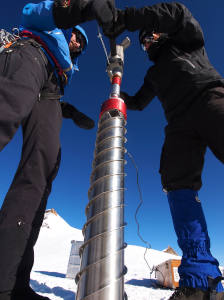 Permafrost stores large quantities of organic carbon (OC) and greenhouse gases. The temperature increase due to climate changes causes the degradation of significant portions of permafrost, as highlighted by the deepening of the surface active layer, making the stored OC content available for microbial decomposition. The metabolic processes and the degradation of frozen soils can therefore release significant quantities of greenhouse gases into the atmosphere, such as carbon dioxide and methane, leading to further atmospheric warming. The extent, the speed of thawing, the spatial variability of these processes are still poorly understood and represent one of the main unknown factors in the prediction of climate feedback. In addition, viruses and bacteria segregated in the permafrost could be reactivated and circulated in food webs. The risks associated with the degradation of rock permafrost in mountain environments, both alpine and polar, as well as those deriving from the growing contraction of the underground cryosphere, represent new challenges to be faced in the near future. Furthermore, underwater permafrost, formed during the last ice age, represents a very important factor for the stability/instability of coastal areas and structures founded on the seabed.
Permafrost stores large quantities of organic carbon (OC) and greenhouse gases. The temperature increase due to climate changes causes the degradation of significant portions of permafrost, as highlighted by the deepening of the surface active layer, making the stored OC content available for microbial decomposition. The metabolic processes and the degradation of frozen soils can therefore release significant quantities of greenhouse gases into the atmosphere, such as carbon dioxide and methane, leading to further atmospheric warming. The extent, the speed of thawing, the spatial variability of these processes are still poorly understood and represent one of the main unknown factors in the prediction of climate feedback. In addition, viruses and bacteria segregated in the permafrost could be reactivated and circulated in food webs. The risks associated with the degradation of rock permafrost in mountain environments, both alpine and polar, as well as those deriving from the growing contraction of the underground cryosphere, represent new challenges to be faced in the near future. Furthermore, underwater permafrost, formed during the last ice age, represents a very important factor for the stability/instability of coastal areas and structures founded on the seabed.
The Institute of Polar Sciences research investigates snow and ice, their chemical composition as well as the main physical parameters, the evolution of permafrost and the impact that permafrost degradation has on the atmosphere, biosphere and hydrosphere, both regionally and globally.
Main ERC Panels:
• LS8 - Ecology, Evolution and Environmental Biology
• PE4 - Physical and Analytical Chemical Sciences
• PE10 - Earth System Science
• SH2 - Institutions, Values, Environment and Space
• SH7 - Human Mobility, Environment, and Space
Hydrosphere
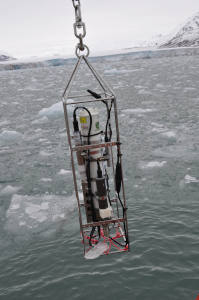 Most of the water in the hydrosphere is contained in the oceans, and marine currents are the most efficient system for heat distributing around the world. In this sense, the oceans and the movements of water masses are one of the main factors in controlling the global climate. In the polar areas occur the most important processes for ocean-atmosphere heat exchange, this is the reason because studies of the hydrosphere in high-latitude areas assume extraordinary importance in understanding global change. The southward retreat of the great chemical-physical Fronts (i.e. Polar Front, sub Antarctic front, etc.) identified by the convergence of different water masses in Antarctica and the significant increase in the Arctic phenomenon named Atlantification are some examples of processes that best describe how global warming is acting on Polar marine environments.
Most of the water in the hydrosphere is contained in the oceans, and marine currents are the most efficient system for heat distributing around the world. In this sense, the oceans and the movements of water masses are one of the main factors in controlling the global climate. In the polar areas occur the most important processes for ocean-atmosphere heat exchange, this is the reason because studies of the hydrosphere in high-latitude areas assume extraordinary importance in understanding global change. The southward retreat of the great chemical-physical Fronts (i.e. Polar Front, sub Antarctic front, etc.) identified by the convergence of different water masses in Antarctica and the significant increase in the Arctic phenomenon named Atlantification are some examples of processes that best describe how global warming is acting on Polar marine environments.
Ocean currents in controlling Terrestrial climate dynamics act both by means global mechanisms mainly related, as already described, to the efficiency of heat transport from equatorial areas to other latitudes, but also through regional processes with locally very strong impacts. To the oceanic water masses have been attributed an important role in the great polar glaciers melting and, in particular, in accelerating the process of melting of the great Arctic and Antarctic ice caps. The stability of these caps remains, to this day, one of the fundamental requirements in order to maintaining the Earth's thermal state in an acceptable equilibrium.
Sea currents transport not only energy, in terms of heat, but also dissolved substances, gases and marine particles that significantly influence the very composition of the waters and, ultimately, the Earth's climate. The study of the geochemistry of polar water masses, in particular by the acquisition of long time series of data, allowed to assess the relationships between the different water masses (recently formed and/or "old" water from lower latitudes), to understand the processes currently in progress and to provide the necessary data for models formulation and implementation, useful to understand the interaction of the different water masses and, more generally, the evolution of the Earth's climate system. Ocean currents carry in their Particles suspended loading, not yet fully quantified, of pollutants and microplastics that have a significant impact on polar ecosystems.
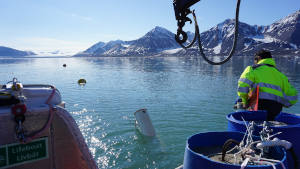 Changes in the composition of polar waters that are rapidly occurring, as result of global change processes also have a strong impact on the biotic compartment in the sea water. Changes in the composition of water masses also lead to changes in oxygen and nutrient inputs, thereby influencing marine biological components. The long polar night strongly affects organic production under the seasonal sea ice, especially in terms of the flow of matter available to the marine trophic network. Marine basins are also ultimate receptors of all detrital and organic particulate matter washed from the continent. A stream of continental-derived material along with residual organic matter originating from primary productivity from the photic layer precipitates continuously along the water column.
Changes in the composition of polar waters that are rapidly occurring, as result of global change processes also have a strong impact on the biotic compartment in the sea water. Changes in the composition of water masses also lead to changes in oxygen and nutrient inputs, thereby influencing marine biological components. The long polar night strongly affects organic production under the seasonal sea ice, especially in terms of the flow of matter available to the marine trophic network. Marine basins are also ultimate receptors of all detrital and organic particulate matter washed from the continent. A stream of continental-derived material along with residual organic matter originating from primary productivity from the photic layer precipitates continuously along the water column.
The portion of free (runoff) fresh water that is part of the hydrosphere is a minimal but fundamental amount for the development of vegetation in the soil and thus favours the transfer of carbon along the trophic network. Current climate changes, progressively favour its circulation in the active permafrost layer. In addition to this water, rivers in the Arctic are important vehicles of biotic and abiotic substances to the sea, including pollutants. Polar lakes are terrestrial boundary sites for aquatic species, whose blooming is generally inversely proportional to their height above sea level and closeness to glaciers, where bird species are important for nutrient input.
Main ERC Panels:
• LS8 - Ecology, Evolution and Environmental Biology
• PE4 - Physical and Analytical Chemical Sciences
• PE10 - Earth System Science
• SH2 - Institutions, Values, Environment and Space
• SH7 - Human Mobility, Environment, and Space
Lithosphere
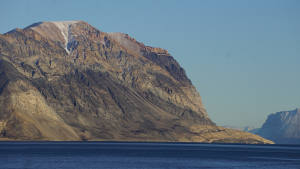 The portions of the lithosphere most subject to changes in relatively rapid times are the more superficial portions of the continental and oceanic crust in its most coastal part. In these areas, also defined as "Critical Zones", the main processes of interaction with all the other environmental compartments take place. Terrestrial dynamics are expressed through the two main processes of erosion and sedimentation. In the polar areas, and in particular in the Arctic, these processes are particularly relevant given that the retreat of the glaciers and the warming of the soil favor the erosive action of the rains with consequent washout of large quantities of eroded soil towards the sea. Much of this particulate matter, whose composition is directly linked to the characteristics of the surrounding environment, settles on the sea bed in continuous layers over thousands or millions of years. For this reason, the marine sediment cores taken in the polar seas are a very important environmental archive, in which the main recent climatic events and those of the geological past are recorded. Through the study of these archives it is possible to evaluate the impact that natural forces have had and may have on the climatic evolution of our planet.
The portions of the lithosphere most subject to changes in relatively rapid times are the more superficial portions of the continental and oceanic crust in its most coastal part. In these areas, also defined as "Critical Zones", the main processes of interaction with all the other environmental compartments take place. Terrestrial dynamics are expressed through the two main processes of erosion and sedimentation. In the polar areas, and in particular in the Arctic, these processes are particularly relevant given that the retreat of the glaciers and the warming of the soil favor the erosive action of the rains with consequent washout of large quantities of eroded soil towards the sea. Much of this particulate matter, whose composition is directly linked to the characteristics of the surrounding environment, settles on the sea bed in continuous layers over thousands or millions of years. For this reason, the marine sediment cores taken in the polar seas are a very important environmental archive, in which the main recent climatic events and those of the geological past are recorded. Through the study of these archives it is possible to evaluate the impact that natural forces have had and may have on the climatic evolution of our planet.
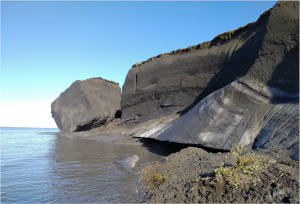 Another important phenomenon is the degradation of the permafrost due to global warming and the consequent release of large quantities of greenhouse gases such as methane and carbon dioxide. The importance of this phenomenon is due to the immense quantity of climate-altering gases stored in the soil whose degradation would release concentrations of greenhouse gases that would have no equal in the recent era of the Earth's history. This release of such a large quantity of greenhouse gases inevitably impacts with negative feedbacks towards the other spheres of the Earth System and with catastrophic repercussions in particular on the fragile balance of the biosphere. In this context, the study of the key processes taking place in the Critical Zone are fundamental to understanding the evolution of the changes to which the polar areas are subject. Furthermore, the reduction of the permafrost on the one hand leads to the enlargement of the thickness of the active layer and on the other it could bring old microorganisms that were previously segregated. Such a biological resource is a genetic reserve to be studied also for biotechnological purposes, but it is also a potential reservoir of hitherto unknown pathogens.
Another important phenomenon is the degradation of the permafrost due to global warming and the consequent release of large quantities of greenhouse gases such as methane and carbon dioxide. The importance of this phenomenon is due to the immense quantity of climate-altering gases stored in the soil whose degradation would release concentrations of greenhouse gases that would have no equal in the recent era of the Earth's history. This release of such a large quantity of greenhouse gases inevitably impacts with negative feedbacks towards the other spheres of the Earth System and with catastrophic repercussions in particular on the fragile balance of the biosphere. In this context, the study of the key processes taking place in the Critical Zone are fundamental to understanding the evolution of the changes to which the polar areas are subject. Furthermore, the reduction of the permafrost on the one hand leads to the enlargement of the thickness of the active layer and on the other it could bring old microorganisms that were previously segregated. Such a biological resource is a genetic reserve to be studied also for biotechnological purposes, but it is also a potential reservoir of hitherto unknown pathogens.
The modifications of the lithosphere caused by climate change can influence the transport of pollutants towards the deeper layers of polar soils. In the portion of the lithosphere related to Plasticene, the plastic particles could favor the thaw of ever deeper portions of the permafrost, varying the dynamics of the environmental fate of the pollutants. As far as the deeper portions of the lithosphere are concerned, the research activities are focused more on the more superficial effects highlighted by the presence of hydrothermal vents in the sea and/or other geothermal phenomena present in the lithosphere in polar areas.
Main ERC Panels:
• LS8 - Ecology, Evolution and Environmental Biology
• PE4 - Physical and Analytical Chemical Sciences
• PE10 - Earth System Science
• SH2 - Institutions, Values, Environment and Space
• SH7 - Human Mobility, Environment, and Space
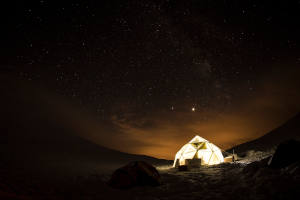 The Earth system is highly interconnected. In this thematic area research activities are aimed at deepening our understanding of the processes and interactions among the different components of the climate system and assessing its responses to global changes. A more comprehensive and holistic understanding of the polar system is needed to guide future climate policy decisions. The knowledge of the characteristics of the polar atmosphere is crucial for studying the biogeochemical cycles of natural chemical species, the long-range transport processes of pollutants and climate-altering compounds and the feedback mechanisms triggered by the atmospheric warming and the interaction of the atmosphere with the cryosphere and oceans.
The Earth system is highly interconnected. In this thematic area research activities are aimed at deepening our understanding of the processes and interactions among the different components of the climate system and assessing its responses to global changes. A more comprehensive and holistic understanding of the polar system is needed to guide future climate policy decisions. The knowledge of the characteristics of the polar atmosphere is crucial for studying the biogeochemical cycles of natural chemical species, the long-range transport processes of pollutants and climate-altering compounds and the feedback mechanisms triggered by the atmospheric warming and the interaction of the atmosphere with the cryosphere and oceans. 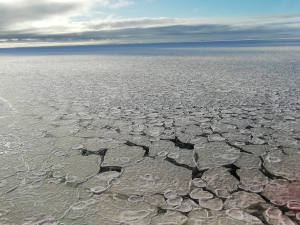 The cryosphere constitutes a very fragile portion of the Earth system, made even more vulnerable by climate change. Through multidisciplinary and interconnected research activities, the study of snow and ice, their chemical composition and their main physical parameters, the evolution of the permafrost and the increased melting impact on the atmosphere, biosphere and hydrosphere at both regional and global levels is being pursued.
The cryosphere constitutes a very fragile portion of the Earth system, made even more vulnerable by climate change. Through multidisciplinary and interconnected research activities, the study of snow and ice, their chemical composition and their main physical parameters, the evolution of the permafrost and the increased melting impact on the atmosphere, biosphere and hydrosphere at both regional and global levels is being pursued.  The atmosphere as an environmental matrix proves to be a medium of rapid global dispersion of climate-altering compounds and pollutants. Various compounds characterize the atmosphere; among these, climate-altering compounds, i.e., greenhouse gases that affect the Earth's energy and heat balance, and atmospheric aerosols, are of relevant interest. Due to its characteristics of stability and thermal inversion and the presence of the polar vortex, the polar atmosphere is an ideal observatory to be able to assess the energy exchanges and interactions of various phenomena with atmospheric circulation, including at different spatiotemporal scales, transport to high latitudes, aerosol composition, and biogeochemical cycles of the natural chemical species and pollutants present. Atmospheric aerosols play a key role in human-induced climate change because they influence the planet's radiative budget (absorption and scattering of solar radiation and surface albedo), cloud formation, and properties. In particular, atmospheric aerosols influence and amplify climate change. Atmospheric particulate matter consists of particles of natural origin (volcanic eruptions, fires, ocean emissions, resuspension of soil dust) and particles of anthropogenic origin (industrial emissions, combustion processes, micro- and nanoplastics). It is critical, thus, to identify chemical, biochemical, and biological tracers to study the origin and composition of polar aerosols and understand their climatic feedback. Although present in trace amounts, organic compounds, black carbon, sea salt, and microplastics (< 100 µm) may act as cloud condensation nuclei, thereby affecting albedo and precipitation, as well as radiation budget and climate. Black carbon, microplastics, and dust could also act as ice-nucleating particles.
The atmosphere as an environmental matrix proves to be a medium of rapid global dispersion of climate-altering compounds and pollutants. Various compounds characterize the atmosphere; among these, climate-altering compounds, i.e., greenhouse gases that affect the Earth's energy and heat balance, and atmospheric aerosols, are of relevant interest. Due to its characteristics of stability and thermal inversion and the presence of the polar vortex, the polar atmosphere is an ideal observatory to be able to assess the energy exchanges and interactions of various phenomena with atmospheric circulation, including at different spatiotemporal scales, transport to high latitudes, aerosol composition, and biogeochemical cycles of the natural chemical species and pollutants present. Atmospheric aerosols play a key role in human-induced climate change because they influence the planet's radiative budget (absorption and scattering of solar radiation and surface albedo), cloud formation, and properties. In particular, atmospheric aerosols influence and amplify climate change. Atmospheric particulate matter consists of particles of natural origin (volcanic eruptions, fires, ocean emissions, resuspension of soil dust) and particles of anthropogenic origin (industrial emissions, combustion processes, micro- and nanoplastics). It is critical, thus, to identify chemical, biochemical, and biological tracers to study the origin and composition of polar aerosols and understand their climatic feedback. Although present in trace amounts, organic compounds, black carbon, sea salt, and microplastics (< 100 µm) may act as cloud condensation nuclei, thereby affecting albedo and precipitation, as well as radiation budget and climate. Black carbon, microplastics, and dust could also act as ice-nucleating particles.  The presence of these particles in the atmosphere and sea ice impacts albedo and can alter sea ice permeability and solar radiation absorption with feedback on sea ice melt. In a rapidly changing polar area like the Arctic, microplastic pollution adds to the effects of climate change in terms of sources, transport processes, feedback, and ecological consequences. Other stressors present in atmospheric aerosols may include medium volatile organic compounds, water-soluble compounds, phenolic compounds, and trace elements. The presence of chemical stressors affects the physical dynamics of the atmosphere, mainly through interaction with both solar and terrestrial radiation, helping to amplify the increase in air temperature, which in turn impacts sea ice melting, humidity, cloudiness, and precipitation, significantly affecting the climate system. Monitoring the physical parameters and processes and the dynamics of the atmosphere through the use of various measurement methodologies (including remote sensing) is essential for the in-depth understanding of the synergies between the various components and for developing increasingly efficient weather-climate forecasting models. It is necessary to study in depth all the processes that characterize the atmospheric boundary layer to improve the quality of the results of weather and climate forecasting models.
The presence of these particles in the atmosphere and sea ice impacts albedo and can alter sea ice permeability and solar radiation absorption with feedback on sea ice melt. In a rapidly changing polar area like the Arctic, microplastic pollution adds to the effects of climate change in terms of sources, transport processes, feedback, and ecological consequences. Other stressors present in atmospheric aerosols may include medium volatile organic compounds, water-soluble compounds, phenolic compounds, and trace elements. The presence of chemical stressors affects the physical dynamics of the atmosphere, mainly through interaction with both solar and terrestrial radiation, helping to amplify the increase in air temperature, which in turn impacts sea ice melting, humidity, cloudiness, and precipitation, significantly affecting the climate system. Monitoring the physical parameters and processes and the dynamics of the atmosphere through the use of various measurement methodologies (including remote sensing) is essential for the in-depth understanding of the synergies between the various components and for developing increasingly efficient weather-climate forecasting models. It is necessary to study in depth all the processes that characterize the atmospheric boundary layer to improve the quality of the results of weather and climate forecasting models. 

















